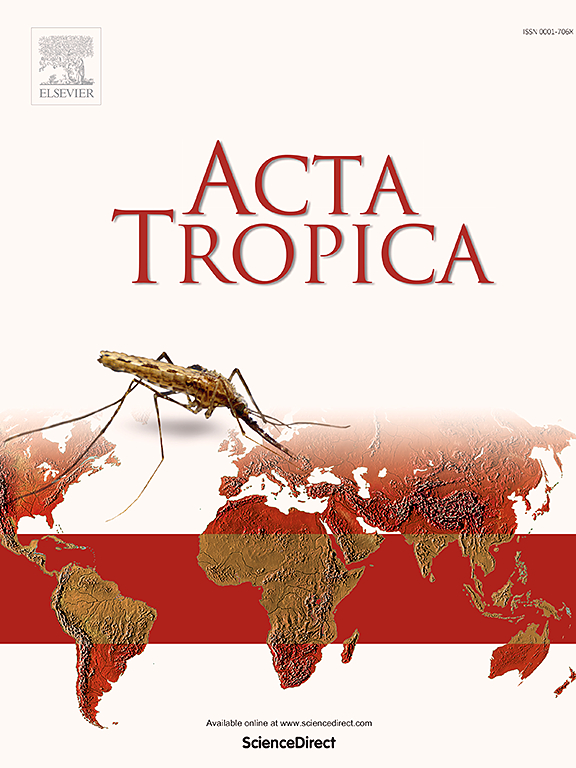表达MIC8、AMA1或RON4的重组痘苗病毒诱导对刚地弓形虫ME49株感染的保护作用
IF 2.5
3区 医学
Q2 PARASITOLOGY
引用次数: 0
摘要
刚地弓形虫感染是一种全球流行的潜在严重疾病,特别是在婴儿和免疫功能低下的个体中。尽管其影响广泛,但目前还没有获得许可的疫苗可供人类使用。弓形虫抗原MIC8、AMA1和RON4已被确定为能够诱导对弓形虫病免疫的候选抗原。在本研究中,我们制备了表达MIC8 (MIC8-rVV)、AMA1 (AMA1-rVV)或RON4 (RON4-rVV)的重组痘苗病毒(rVV),并在小鼠中评估了每种rVV的疫苗功效。小鼠鼻内接种两次rVV,随后用弓形虫ME49菌株攻毒。所有三种rVV疫苗均诱导弓形虫特异性免疫球蛋白(Ig)G和IgA反应,以及CD8 + T细胞和总B细胞的显著活化。所有免疫小鼠100%存活,而naïve对照组没有。在这三种疫苗中,MIC8-rVV引发了最强的CD8 + T细胞和B细胞反应,导致弓形虫ME49菌株攻击后脑囊肿计数减少最多。这些发现表明,基于rv的MIC8、AMA1和RON4抗原递送可赋予对弓形虫ME49株感染的保护性免疫,MIC8成为特别有希望的候选疫苗。本文章由计算机程序翻译,如有差异,请以英文原文为准。
Recombinant vaccinia virus expressing MIC8, AMA1, or RON4 induce protection against Toxoplasma gondii ME49 strain infection
Toxoplasma gondii (T. gondii) infection is a globally prevalent and potentially severe disease, particularly in infants and immunocompromised individuals. Despite its widespread impact, no licensed vaccine is currently available for human use. The T. gondii antigens MIC8, AMA1, and RON4 have been identified as candidates capable of inducing immunity against toxoplasmosis. In this study, we generated recombinant vaccinia viruses (rVV) expressing MIC8 (MIC8-rVV), AMA1 (AMA1-rVV), or RON4 (RON4-rVV), and evaluated the vaccine efficacy of each rVV in mice. Mice were intranasally immunized twice with rVV and subsequently challenged with T. gondii ME49 strain. All three rVV vaccines induced T. gondii-specific immunoglobulin (Ig)G and IgA responses, as well as significant activation of CD8⁺ T cells and total B cells. All immunized mice 100% survived a lethal challenge, whereas the naïve control group did not. Among the three vaccines, MIC8-rVV elicited the strongest CD8⁺ T cell and B cell responses, resulting in the highest reduction in brain cyst counts following T. gondii ME49 strain challenge. These findings demonstrate that rVV-based delivery of MIC8, AMA1, and RON4 antigens can confer protective immunity against T. gondii ME49 strain infection, with MIC8 emerging as a particularly promising vaccine candidate.
求助全文
通过发布文献求助,成功后即可免费获取论文全文。
去求助
来源期刊

Acta tropica
医学-寄生虫学
CiteScore
5.40
自引率
11.10%
发文量
383
审稿时长
37 days
期刊介绍:
Acta Tropica, is an international journal on infectious diseases that covers public health sciences and biomedical research with particular emphasis on topics relevant to human and animal health in the tropics and the subtropics.
 求助内容:
求助内容: 应助结果提醒方式:
应助结果提醒方式:


